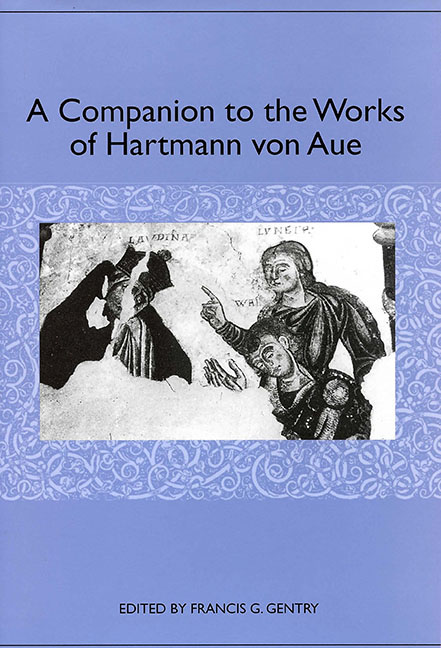Book contents
- Frontmatter
- Contents
- Acknowledgments
- Introduction
- Hartmann's Theological Milieu
- Hartmann von Aue as Lyricist
- Hartmann von Aue and Chrétien de Troyes: Respective Approaches to the Matter of Britain
- Gender and Love in the Epic Romances of Hartmann von Aue
- The Two-Fold Path: Erec and Enite on the Road to Wisdom
- The Body in Pain in the Works of Hartmann von Aue
- Illness and Cure in Hartmann von Aue's Arme Heinrich and Iwein
- Hartmann's Legends and the Bible
- Hartmann's Works in the Visual Arts
- The Medieval Literary Reception of Hartmann's Works
- A Tale of Sacrifice and Love: Literary Way Stations of the Arme Heinrich from the Brothers Grimm to Tankred Dorst
- Editions and Translations of Hartmann's Works
- Works Cited
- Notes on the Contributors
- Index
Hartmann von Aue as Lyricist
Published online by Cambridge University Press: 27 April 2017
- Frontmatter
- Contents
- Acknowledgments
- Introduction
- Hartmann's Theological Milieu
- Hartmann von Aue as Lyricist
- Hartmann von Aue and Chrétien de Troyes: Respective Approaches to the Matter of Britain
- Gender and Love in the Epic Romances of Hartmann von Aue
- The Two-Fold Path: Erec and Enite on the Road to Wisdom
- The Body in Pain in the Works of Hartmann von Aue
- Illness and Cure in Hartmann von Aue's Arme Heinrich and Iwein
- Hartmann's Legends and the Bible
- Hartmann's Works in the Visual Arts
- The Medieval Literary Reception of Hartmann's Works
- A Tale of Sacrifice and Love: Literary Way Stations of the Arme Heinrich from the Brothers Grimm to Tankred Dorst
- Editions and Translations of Hartmann's Works
- Works Cited
- Notes on the Contributors
- Index
Summary
Hartmann von Aue demonstrated his poetic versatility and accomplishment not only with innovative contributions to the development of verse tales and romances with chivalric and religious themes, but also as a lyricist, or Minnesänger. Hartmann is remembered first and foremost for his narrative works, a conclusion that is supported by the content of Gottfried von Strassburg's famous praise of him in the Middle Ages and by the preponderance of the critical literature on Hartmann in modern times. His lyrical works, by contrast, have tended to receive less attention, and frequently have received less than glowing critical reviews (Salmon; Seiffert 1968, 1–2). Nonetheless, had he left behind nothing more than his lyrics, Hartmann would still have to be regarded as a significant and fascinating poet, by virtue of the many contributions he made to the poetic treatment of love, clearly a topic of intense interest in the High Middle Ages. Indeed Seiffert, in a later study, posits that the poetic range of Hartmann's lyrics is as broad as that of his narrative works, and places Hartmann right alongside the greatest high medieval German lyric poet, Walther von der Vogelweide (ca. 1170–ca. 1230), because of the former's “formidable talents in distinctive types of poetic composition” (1982, 86).
Because Hartmann is one of the few poets who composed both narrative poetry and love songs — Heinrich von Veldeke (d. around 1200) and Wolfram von Eschenbach (d. around 1220) being the other noteworthy cases — we can try to comprehend Hartmann's works in one genre with an eye on those he produced in the other. For scholars in the nineteenth century, for example, who tried to establish a relative chronology of his works in terms of important events in the poet's life, the lyrics seemed to provide crucial evidence. An initial phase of youthful writing was often postulated, during which time the Klage, Erec, and possibly the beginning of Iwein may have been written, at about the same time as Hartmann composed the songs of love for his lady.
- Type
- Chapter
- Information
- A Companion to the Works of Hartmann von Aue , pp. 21 - 42Publisher: Boydell & BrewerPrint publication year: 2004



